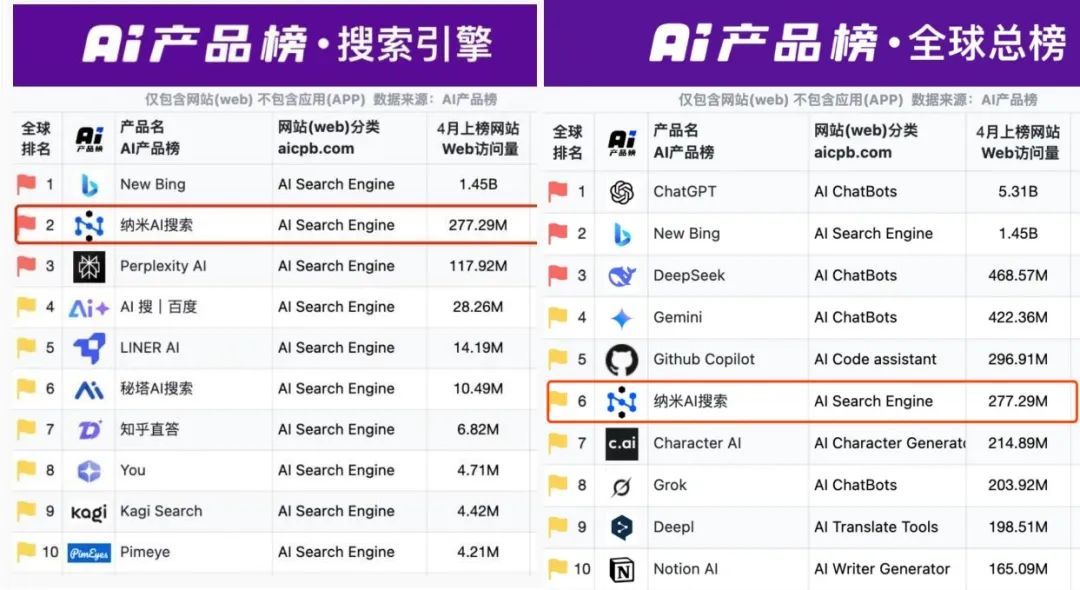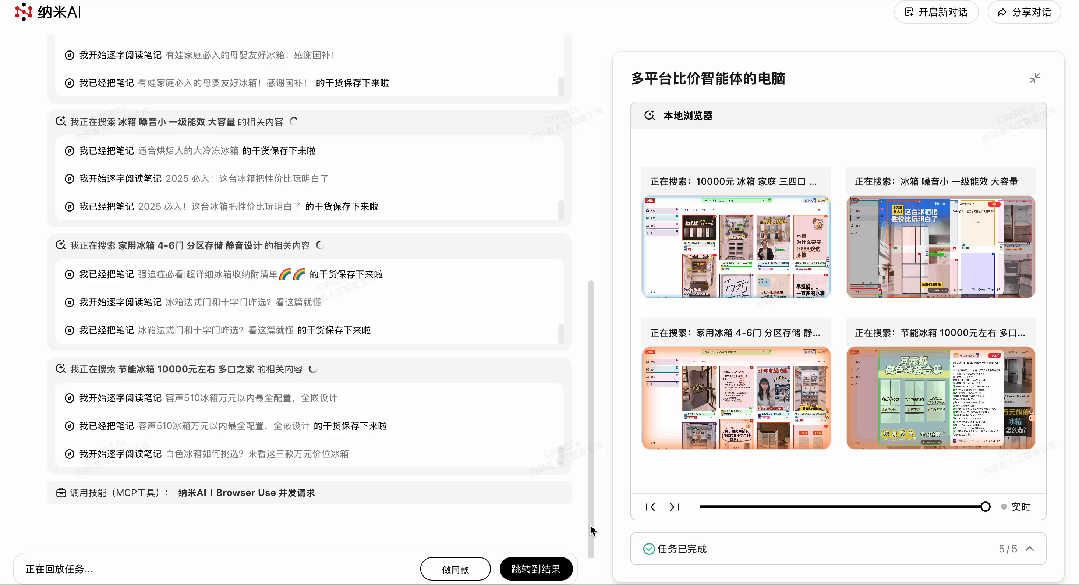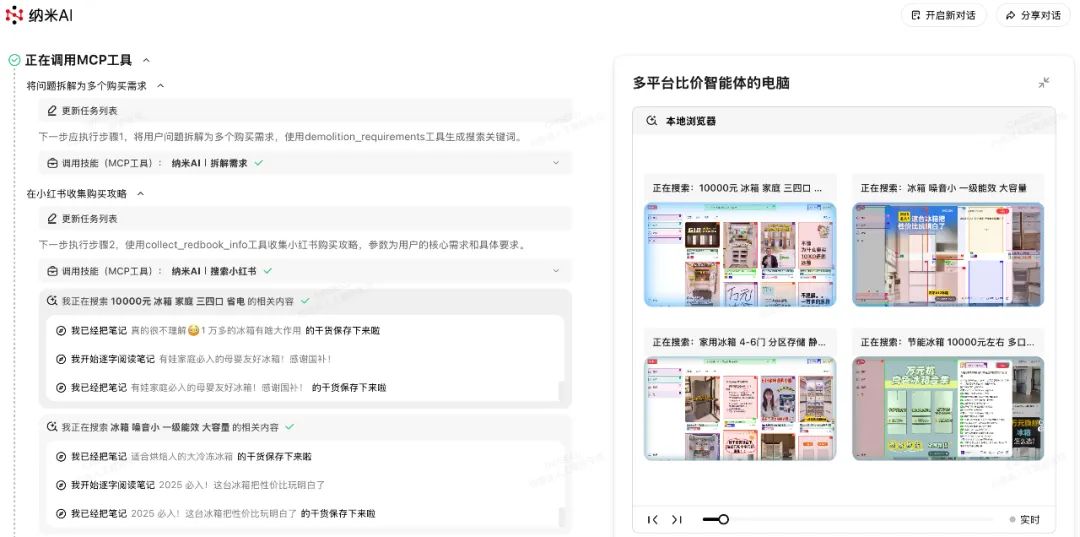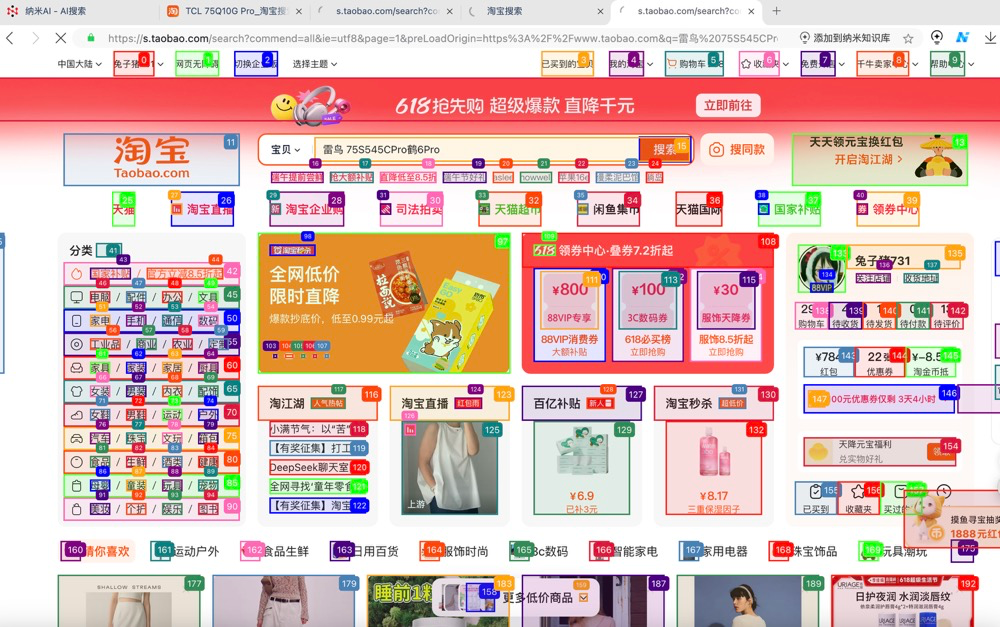Nano AI Search Empowers Zhou Hongyi to Reach 'Number One in China'
![]() 05/29 2025
05/29 2025
![]() 587
587

Nano AI Search has successfully captured Zhou Hongyi's traffic.
A few days ago, Zhou Hongyi announced the conclusion of his 93-day car giveaway event, fulfilling his promise to distribute 100 domestic new energy vehicles. From the outset, Zhou Hongyi was transparent about the event's purpose, stating, "As I accumulate traffic, I aim to promote AI and engage in live streaming to sell goods."
A crucial aspect of this "AI promotion" is enhancing Nano AI Search's popularity. Judging by the results, Nano AI Search has excelled, becoming a national-level super application in under six months and attracting significant traffic from Zhou Hongyi.
Nano AI Search Leads in China, Ranks Second Globally
According to the recently released April rankings of the Global AI Product List, China's AI applications have shown remarkable performance.
Among them, Nano AI Search tops the Chinese AI search engine market. Globally, it ranks second, trailing only Microsoft's New Bing and surpassing Perplexity, a renowned overseas AI search product with a latest valuation of $14 billion. In terms of monthly active users (MAU), among the top ten AI websites (Web) globally, only DeepSeek and Nano AI Search from China are listed.

Source: AI Product List
Looking at the longer-term trend, since its launch last year, Nano AI Search's traffic has consistently risen. Third-party data indicates that its traffic surpassed 1 million on the first day and quickly ascended to the top 20 of Apple's App Store efficiency rankings. Its monthly traffic exceeded 300 million visits that month, more than triple that of Perplexity AI during the same period, making it one of the world's most visited AI-native search engines.
Zhou Hongyi is highly satisfied with Nano AI Search achieving 'Number One in China'. During a live stream of the car giveaway event, he noted that Nano AI Search is 360's fastest-growing product in terms of user growth. Its outstanding performance signifies that it has become 360's strongest weapon in the AI search battle and a significant breakthrough for 360's strategic transformation.
With the explosion of ChatGPT at the end of 2022, artificial intelligence (AI) has entered the era of large models, and "all products will be reconstructed by AI," including search engines. Users, particularly younger ones, have undergone revolutionary changes in their search habits, evolving from traditional "searching" to "asking AI when in doubt."
This wave of "large models reconstructing search" has also emerged as a new battleground for internet giants. For instance, Baidu launched "AI Search," aiming to create a super productivity tool integrating AI search, intelligent creation, idea inspiration, AI reading, etc. Tencent introduced AI search ima, becoming the only platform that can integrate public account resources across the entire network.
In November 2024, 360 upgraded its AI search product to "Nano AI Search." Over the following months, leveraging its technological accumulation in traditional search, browsers, and clients, Nano AI Search iterated at an intense pace of every two to three weeks, successively launching functions such as multimodal fusion question answering (e.g., the full-featured version of DeepSeek during the Spring Festival), knowledge bases (second brain), agents, and MCP toolboxes.
Recently, 360 upgraded Nano AI Search to "Nano AI Super Search," transforming the AI search into a super search agent capable of independent thinking, planning, and simultaneously mobilizing tools to execute tasks. With just one command, Nano AI Super Search can break down information silos, truly realizing "everything can be searched with just one sentence."
Industry's First AI Super Search
Earlier this year, Zhou Hongyi publicly predicted at an event that 2025 would be the year of agents, emphasizing the use of agents to comprehensively enhance the automation and intelligence levels of large model application scenarios. He also proposed that for specialized large models to become applicable, they must evolve into agents, "from generative AI to agentic AI."
In simple terms, while large models can understand, answer questions, and generate content, they "cannot directly perform tasks." Large models can only execute specific tasks by evolving into agents with capabilities such as knowledge acquisition, reasoning, tool usage, and system architecture.
Obviously, Nano AI Super Search is putting this concept into practice, becoming the industry's first AI search super agent by being the pioneer in encapsulating high-level agents, public domain internet search retrieval, private domain knowledge base retrieval, MCP toolboxes, and multimodal content generation capabilities in the direction of AI search.

Source: Nano AI Super Search screenshot
After the upgrade, Nano AI has significantly blurred the boundary between AI agents and search. From the perspective of the entire task execution process, Nano AI Super Search resembles an "enhanced version" or "PLUS version" of DeepResearch.
Taking the browser version as an example, the most prominent position on the Nano AI Search homepage is a striking "search box." Below it, the default is "AI Search," suggesting tasks such as "input any question, and I can help you search, answer questions, provide suggestions, and even write research reports."
To its right, a new "Super Search" option indicates that it is a "super search agent with autonomous thinking, task planning, and execution capabilities, providing better search results and experiences."
After watching a Nano AI promotional video for automatic price comparison and selection for 618 e-commerce shopping, I used Nano AI Super Search to replicate it, casually entering the instructions (purchase requirements) from the promotional video into the super search box: "Budget around 10,000 yuan, looking for a refrigerator suitable for a family of three to four people, energy-efficient, large capacity. Not too noisy, and don't make me clean ice every month."
Nano AI Super Search Demonstration of Fully Automatic Product Selection
Nano AI Super Search swiftly analyzed my real needs and invoked the MCP universal toolbox, chaining price comparison, shopping, and adding to cart tasks. Four AIs simultaneously opened browsers to read product notes and purchase guides, streamlining cumbersome processes with one click, enhancing efficiency by 400%.
Throughout the task, Nano AI Super Search followed the steps of "finding purchase guides - analyzing product information - comparing products - adding to cart," real-time comparing SKU prices across e-commerce platforms, and also integrating users' authentic evaluations of products - the only search engine in China capable of deeply reading comments, follow-up reviews, bulletin board messages, and related graphic and text information - intelligently filtering out the most cost-effective products and automatically generating and delivering visual reports.
Most notably, Nano AI Super Search can even help me add items to the cart with one click, and I only need to click to purchase, assisting me in making purchase decisions. This scenario was publicly demonstrated by former Honor CEO Zhao Ming at an Honor launch event, where he showed "buying coffee with one command," and Nano AI Super Search achieves "completing price comparison shopping with one command" on PCs.

Reproduction demonstration recording
I found that this is a fully anthropomorphic standard operation process. The task execution page is divided into two parts: the left half is a visual window showing the steps of Nano AI Super Search executing tasks, allowing dynamic attention to the operation status of each step. The right half is the "computer of the multi-platform price comparison agent," which can review the tools invoked and task execution details during each step of the task.
For example, in the subtask "analyzing product information," I can see where the task is in the "update task list" on the right; "invoke skills" involves invoking "Nano AI | Search Taobao products" and "Nano AI | Search JD.com products" to search for refrigerator products within the target price range on the two e-commerce platforms, and ultimately analyzing "Taobao & JD.com data" based on "Nano AI | Multi-page search."
This is because Nano AI Super Search integrates agent capabilities with search, enabling precise breakdown of the original question to grasp the user's true intent.

Source: Reproduced price comparison command, Nano AI Super Search analyzes Xiaohongshu notes
During my experience, while it did not seem particularly impressive when performing conventional subtask searches based on instructions, it could only be considered a basic skill of current AI agents. What impressed me was that Nano AI Super Search created new main tasks, broke them down, and crossed data and content walls during tasks, searching for information sources or file formats from platforms such as Taobao, JD.com, and Xiaohongshu.
In this scenario, Nano AI Super Search serves as a practical life assistant, fully automating daily tasks. It can provide shopping advice, automatically compare prices, and find the most cost-effective options; it can also plan itineraries, flights, and hotels for outings and annual leave trips, enabling "spontaneous" travel.
Compared with other cases, Nano AI Super Search not only displays information that traditional search engines can easily obtain but also crosses content and data walls to access specialized knowledge in vertical fields such as document libraries (including paid document libraries and foreign authoritative thesis libraries), e-commerce price comparisons, and Gaode Maps.

Nano AI Super Search learns e-commerce platform product information
Moreover, Super Search also possesses multimodal information acquisition capabilities, allowing direct access to platforms such as Xiaohongshu and Dianping, and also supporting the mining of video content from platforms like Bilibili, Douyin, and 360 Video as information sources. Search results support multiple modalities and formats such as Word, PDF, PPT, audio and video, interactive webpages, and charts and mind maps. It also integrates a sandbox environment where collected data can be converted into various charts through code - a more advanced approach.
At this point, users need not worry excessively about personal computer privacy and security issues. Because Nano AI Super Search seamlessly integrates 360's "national-level security capabilities," operating in a sandbox environment, ensuring that data does not go to the cloud, respecting privacy, and not reading user private information without authorization, eliminating the risk of data leakage.
It should be noted that MCP stands for "Model Context Protocol." Put simply, it is the "USB-C port for AI applications," enabling a "digital connection" for AI models to obtain information and use tools uniformly.
Nano AI Search launched the "MCP Universal Toolbox" in April, accessing over 110 tools covering scenarios such as office collaboration, academics, lifestyle services, and search engines, supporting users and developers in invoking thousands of tools specifically designed for AI and using these tools to create their own agents. Moreover, Nano AI Search chose the MCP to C route, establishing a local client + MCP freely callable market, an open MCP product ecosystem similar to the App Store.
360 Sample of Super Search Agent
I have previously pointed out that the essence and value dimensions of "AI + search" are undergoing transformation. Based on new AI capabilities, the search industry presents a division between traditional search and AI search. Traditional search is inertially path-dependent, continuously adding AI functions based on existing user scale, product volume, and business models to increase AI content.
Zhou Hongyi positions Nano AI Search as a "generative answer engine," also known as a "multimodal content creation search engine" in official promotional materials. He hopes that Nano Search can start from the micro level to help users solve problems, completing the full closed loop from search to creation through the four functions of "search, learn, write, create," thereby reshaping search.
He has explained that the new product is named "Nano Search" for two reasons: firstly, to create a brand-new search brand, with the word "nano" representing the pinnacle of technological development and having high recognizability; secondly, "nano" is an extremely small unit of measurement, and Nano Search hopes to start from the micro level to help users solve problems, reshaping search through the four functions of "search, learn, write, create."
In other words, the browser, client, and search advantages of PCs have been secondarily extended in the era of large models. What should AI search look like, and how to define it, Nano AI Search has set an example.
This model, first validated and pioneered by 360, namely the "AI search + browser + client" model, is being followed by overseas giant Google. At the recently concluded I/O Developer Conference, Google announced the addition of a new "AI Mode" to the Chrome browser. Driven by the Gemini 2.0 model, this mode combines multimodal reasoning, deep search, and personalization features to provide users with a more intelligent, conversational search experience.
For example, the AI Mode of the Chrome browser introduces the Deep Search feature, which automatically performs hundreds of searches for in-depth research questions, generating expert-level reports with citations, significantly shortening research time.
Furthermore, the Project Mariner agent function equips the AI Mode with the capability to execute multi-step tasks, including searching and filtering event tickets that align with the user's budget and even completing purchases via Google Pay. Google announced that the AI Mode has collaborated with platforms like Ticketmaster and StubHub to support scenarios such as event ticketing and restaurant reservations, with plans to expand to additional services in the future.
Google has also transitioned from traditional search to AI search. Its search leader emphasized, "To glimpse the future of the internet's foremost search engine, simply activate the 'AI mode'."
Perhaps he was already aware that Chinese users had already gained a "sneak peek" of nano AI search. In a sense, large models have leveled the playing field for all AI players. Early starters may not necessarily prevail, and front-runners could be overtaken by latecomers. However, those who diligently accumulate strength will undoubtedly experience a significant breakthrough at a crucial moment, securing top industry rankings.
360 inherently possesses the product and technology DNA of AI search, creating the most open user and product ecosystem from an AI-to-consumer perspective. Moreover, 360 has been strategically positioning itself around AI search: Since the inception of nano AI search, multiple major version iterations have been implemented, ranging from OCR, large model Q&A to multimodal layout. Beginning in 2025, MCP tools and advanced agents have been integrated, intensifying and erupting its product and search technology capabilities.
This is a contest of ecological prowess. Setting aside communication "noise," many recognize that Zhou Hongyi and 360 have consistently been indispensable players at the table. They have firmly secured a ticket to the era of large models.
"AI, All in One"
While disrupting traditional search and achieving a cross-generational upgrade in "technology + product + experience," the large AI model also presents a challenge for AI vendors: aligning new technologies with the needs of everyday users and catering to their increasingly diverse demands. It's crucial not to elevate the profile of new technologies too high, thereby creating a "communication gap" with users. This aligns with the broader requirement of AI equity or inclusion.
Zhou Hongyi envisions nano AI search as an entry-level product for the public to comprehend, learn, utilize, and master AI. By transforming and reshaping search through AI, he aims to minimize the barrier for users to embrace AI. He once asserted that nano AI search can be used by "5-year-olds and 80-year-old grandmothers."
His guiding principle is "AI, All in One," which essentially evolves nano AI search into a super entry encompassing personal life and industrial upgradation through technology integration, ecological openness, and scenario penetration. The demonstrated results of nano AI super search also exemplify "All in One."
Nano AI search boasts two significant advantages in this realm: Firstly, 360 has amassed a profound foundation in search, having constructed a self-built index library of 100 billion levels and a boutique library of 10 billion levels. Secondly, the open design of nano AI, which accesses more MCP Servers, will progressively enhance its professional content search capabilities.
When I tasked nano AI super search with tracking the product characteristics and user comment trends of popular "new Chinese-style clothing" notes on Xiaohongshu and Douyin over the past three months, it swiftly generated a "Social Media Dissemination Analysis Report on New Chinese-style Clothing" for me. This report provided expert insights into the popularity trends on both platforms, style characteristics of popular note products, comment trend analysis, feature and comment correlation analysis, and operational strategy comparisons. Lastly, it offered "research conclusions" on how merchants can overcome growth obstacles.
Based on past experience, this report holds significant value for guiding SEO. Even if delegated to a professional team, it would take at least a week to complete. With nano AI search evolving into super search, the cost of merchant SEO will drastically decrease, and efficiency will significantly increase, making it an indispensable tool for cost reduction and efficiency enhancement.
For platforms, the challenge of commercialization may be alleviated. For instance, AI applications do not exhibit diminishing returns in commercialization; the better the product performance, the higher the subsequent costs. They may be better suited for user-paid business models.
Industry ranking data merely represents a phased effect and achievement of nano AI in creating a super search paradigm. As 360's starting point for reshaping search and executing strategic transformation, with the proliferation of intelligent agents, the core potential of nano AI super search is even greater.
Of course, the challenges it faces will not be trivial, and 360 will encounter similar issues as its competitors. Previously, the industry referred to large model vendors like Baichuan Intelligence, Lingyi Wanwu, and Jieyue Xingchen as the "Six Little Dragons of Domestic Large Models." From the development trajectories of Baichuan Intelligence, Lingyi Wanwu, and others, it's evident that in the race to survive among large models, staying at the table is more crucial than ever.
But 360 not only stays at the table; it has consistently been a prominent player. With a strong hand, it possesses the "bargaining power" for the forthcoming AI search battle.
Reference Materials:
Quantum Bit, "Search SEO Reshaped by AI, Highlighting the Value of Professional Content Communities"
Tang Chen, "Did Tencent QQ Browser 'Replicate' Quark?"
China Business News, "Nano AI Search Wins 'People's Ingenious Product' Award, Leading the Era of Search Engine 3.0"







